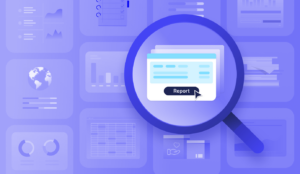Introduction
Consider Odoo Accounting Software if you need a flexible accounting solution that scales with your business. Its intuitive interface makes invoicing, expense tracking, and bank reconciliation simple, so you can manage your finances without the usual headaches. With its modular setup, you can add the tools you need, ensuring you’re only paying for features that benefit you.
Looking for customization? Odoo’s seamless integration with other apps allows you to tailor the system to fit your business workflow perfectly. However, if you want to unlock its full potential, you’ll need to invest time in setting it up or hire someone to handle the configuration.
Odoo Accounting delivers excellent value with its versatility, but expect to upgrade from the free version for premium features. If you want an accounting platform that adapts as your business grows, Odoo is a powerful choice that won’t disappoint.
>>> MORE: QuickBooks Invoicing vs FreshBooks
LET’S CUT TO THE CHASE!
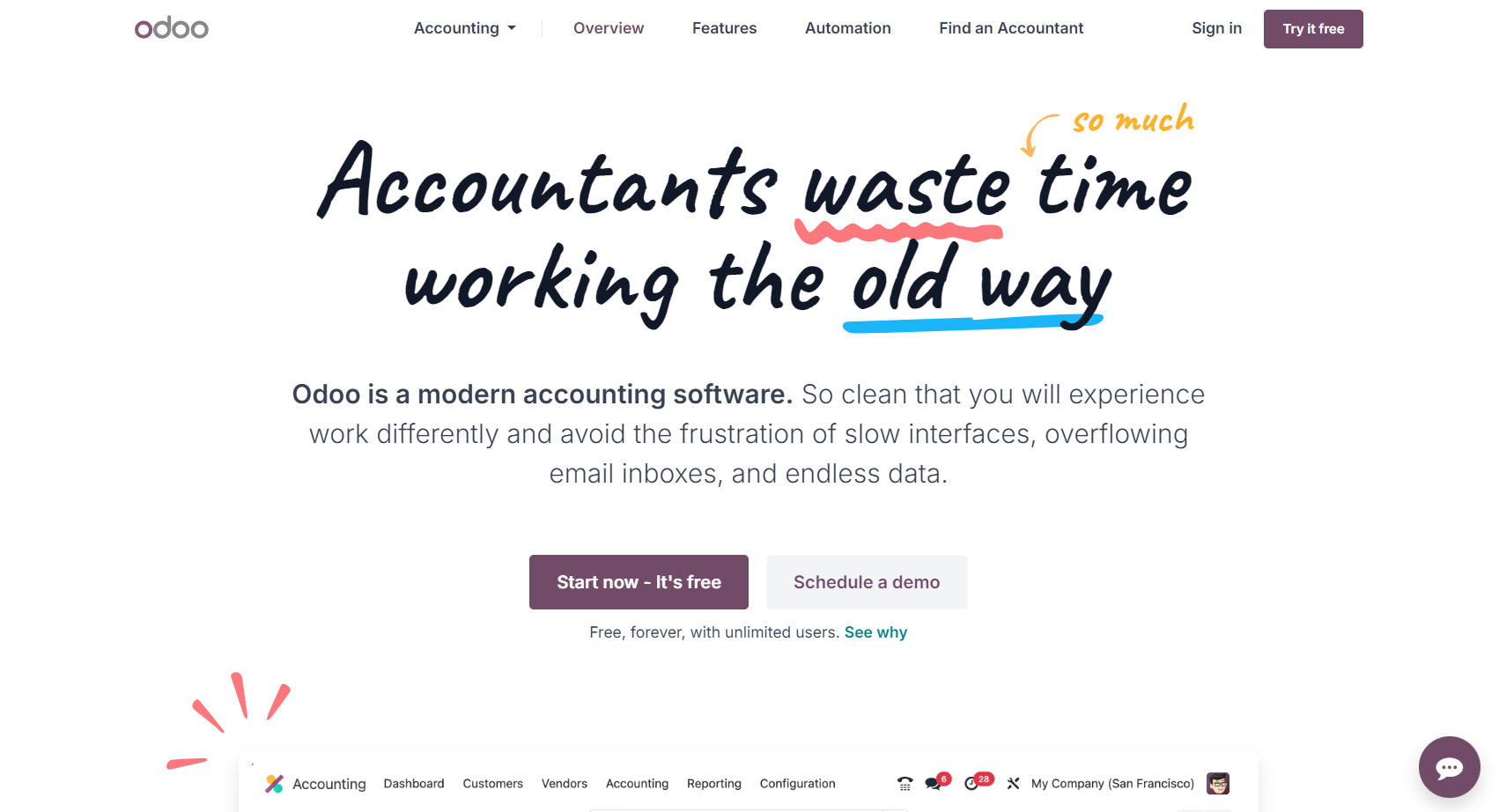
- You want a fully integrated accounting solution that works seamlessly with other business apps like CRM, sales, and inventory, all within the Odoo ecosystem.
- You need real-time financial insights, with Odoo’s reporting tools giving you a clear, up-to-date picture of your company’s performance.
- You want affordable, modular pricing, so you only pay for the features you actually use, making it a flexible choice for businesses of any size.
- You appreciate a user-friendly interface that simplifies everything from invoicing and bank reconciliation to managing multiple currencies.
- You value customization, as Odoo allows you to tailor the platform to fit your business needs, scaling effortlessly as you grow.
- You’re looking for automation tools to streamline tasks like invoicing, tax calculations, and expense reporting, saving you time and reducing manual errors.
- You expect regular, free updates, as Odoo charges for upgrades beyond the initial version, leading to unexpected costs over time.
- You find the user interface cluttered and confusing, especially on mobile devices, which can hinder efficiency when managing your accounting tasks.
- You want an intuitive invoicing process, since Odoo’s layout may feel counterintuitive and could slow down your workflow during busy periods.
- You lack technical expertise or resources, as implementing and customizing Odoo can require significant IT support, which may strain your team.
- You prefer a straightforward, all-in-one solution without the need to juggle multiple modules, as Odoo’s modularity can complicate setup and management.
Odoo Accounting is a great fit if you’re looking for an all-in-one accounting solution that integrates smoothly with other business tools. Its modular approach allows you to tailor the software to your exact needs, making it ideal for businesses that want flexibility and scalability. You’ll benefit from features like automated invoicing, bank synchronization, and real-time reporting to keep your finances in check. However, if you’re after a simple, plug-and-play system or require constant support, Odoo’s complexity and limited customer service might be drawbacks.
NOW, LET’S DETAIL THINGS FOR YOU.
When exploring Odoo Accounting Software, the pricing structure offers various tiers that cater to different needs, but it’s essential to understand what you’re getting at each level.
The One App Free plan stands out as a zero-cost entry point, perfect for individuals or small businesses wanting to dip their toes into Odoo’s offerings. This plan includes core features like hosting, incremental daily backups, and 24/5 support. If you’re just starting or have a tight budget, this plan gives you a risk-free way to test Odoo’s capabilities without any financial commitment.
Moving up, the Standard plan costs $24.90 per user per month for the first year, which then increases to $31.10. This plan provides access to all Odoo apps hosted on Odoo Online and adds more robust features. It’s tailored for small to midsized companies that require comprehensive functionality without the need for customization. If you have a growing team, though, the per-user pricing can add up quickly, making it vital to project your team size over time.
If you need more flexibility, the Custom plan comes in at $37.40 per user per month for the first year and jumps to $46.70 afterward. This plan offers advanced options like multi-company management and external API access, ideal for larger businesses with specific needs. While the features might justify the higher price, it’s crucial to evaluate whether those advanced capabilities align with your operational requirements.
What’s the Catch with Odoo Accounting Software?
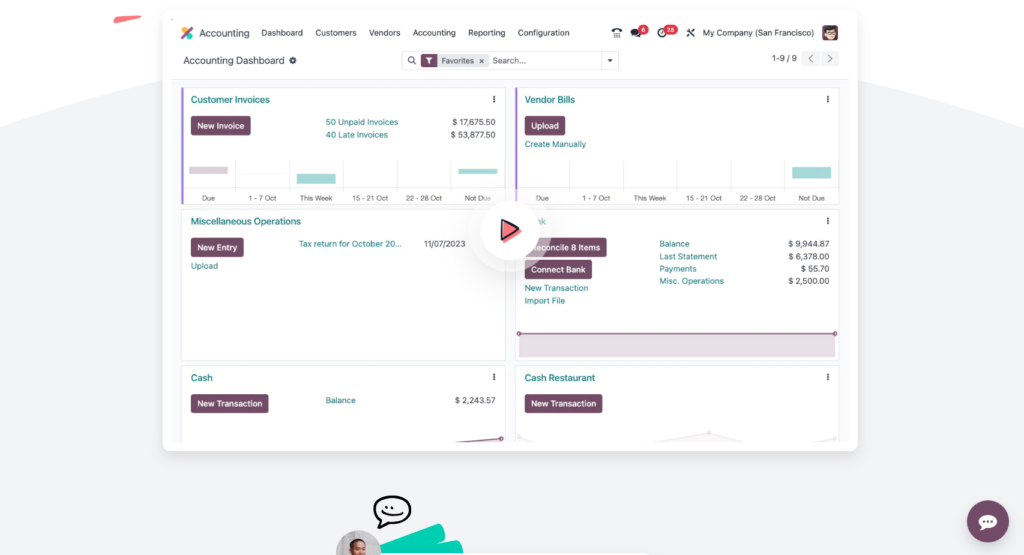
Odoo Accounting Software presents a compelling suite of features, but before diving in, it’s essential to scrutinize its pricing structure closely. While the One App Free plan, which costs $0, appears enticing for users wanting to test the waters, it limits you to just one app. If your needs expand, you’ll quickly find yourself looking at the Standard and Custom plans, which come with monthly fees that can add up.
The Standard plan starts at $24.90 per user per month for the first year, but after that, it jumps to $31.10. For a growing business, these incremental costs can be surprising, especially when you factor in that the pricing is per user. If your team expands, so does your budget.
Now, if customization or multi-company management is on your radar, you’ll need to consider the Custom plan at $37.40 per user per month, increasing to $46.70 after the first year. This plan offers more flexibility and advanced features, but it might feel steep if you’re not ready for such a financial commitment. Plus, businesses with specific requirements may discover additional costs for features that seem essential, which can lead to unexpected expenses.
Another factor to consider is that while Odoo offers a free eLearning platform, it doesn’t guarantee that all training or support will be free. Some users report costs for advanced support options, which can catch you off guard if you’re relying on that resource.
>>> PRO TIPS: Zoho Books vs Neat Accounting
WHAT YOU NEED TO KNOW
Odoo Accounting Software presents a flexible pricing model that caters to various business sizes and needs. It starts with a free plan called One App Free, which allows unlimited users to access a single app without any financial commitment. This plan includes essential features like hosting, incremental daily backups, and 24/5 support, making it a fantastic option for small businesses or individuals looking to explore Odoo’s offerings without any upfront cost.
Need more comprehensive solutions? Odoo offers the Standard plan at $24.90 per user per month for the first year (rising to $31.10 thereafter). This plan unlocks access to all Odoo apps hosted on Odoo Online, enhancing your toolkit significantly. It’s designed for small to midsize companies that need robust functionalities but prefer to avoid the complexities of customization and multi-company management.
If your business has specific customization needs or operates multiple companies, consider the Custom plan, priced at $37.40 per user per month for the first year (then $46.70). This plan includes everything in the Standard tier, along with the flexibility to host on Odoo Online, Odoo.sh, or on-premise. It also grants access to Odoo Studio and the External API, making it ideal for larger organizations with unique requirements.
While Odoo’s pricing structure is competitive, be aware that additional costs may arise depending on the specific features or apps you choose. It’s crucial to evaluate your current and future needs to determine the most suitable plan. Odoo occasionally offers discounts or promotional rates, especially for annual subscriptions, so checking for these opportunities can help you save money in the long run.
What are Odoo Accounting Software Competitors Offering?
Odoo Accounting Software stands out in the ERP landscape, but it faces strong competition from providers like NetSuite, SAP Business One, and ERPNext.
Odoo vs. NetSuite: NetSuite delivers a comprehensive ERP solution packed with features ideal for larger organizations. It excels in scalability and reporting, but you often need to consult for pricing, which can deter smaller businesses. If you’re looking for a straightforward, cost-effective solution, Odoo’s customizable approach and lower total cost of ownership make it an attractive alternative.
Odoo vs. SAP Business One: SAP Business One offers robust business intelligence and multi-currency support, making it a strong choice for global enterprises. However, it requires assistance from a Value Added Reseller for setup, which can add to your expenses. Odoo allows you to implement only what you need, making it more accessible and easier to manage, especially for smaller teams.
Odoo vs. ERPNext: ERPNext is an open-source alternative that provides solid customization options and multilingual support. However, it can struggle with performance when handling large datasets and lacks some of the advanced reporting features that Odoo offers. If you value user-friendliness and efficiency, Odoo’s established ecosystem makes it the better choice for growth-focused businesses.
While NetSuite and SAP Business One provide extensive features, they often come with higher complexity and costs. ERPNext serves as a free alternative but might not match Odoo’s performance and ease of use.
What Affects Odoo Accounting Software Prices?
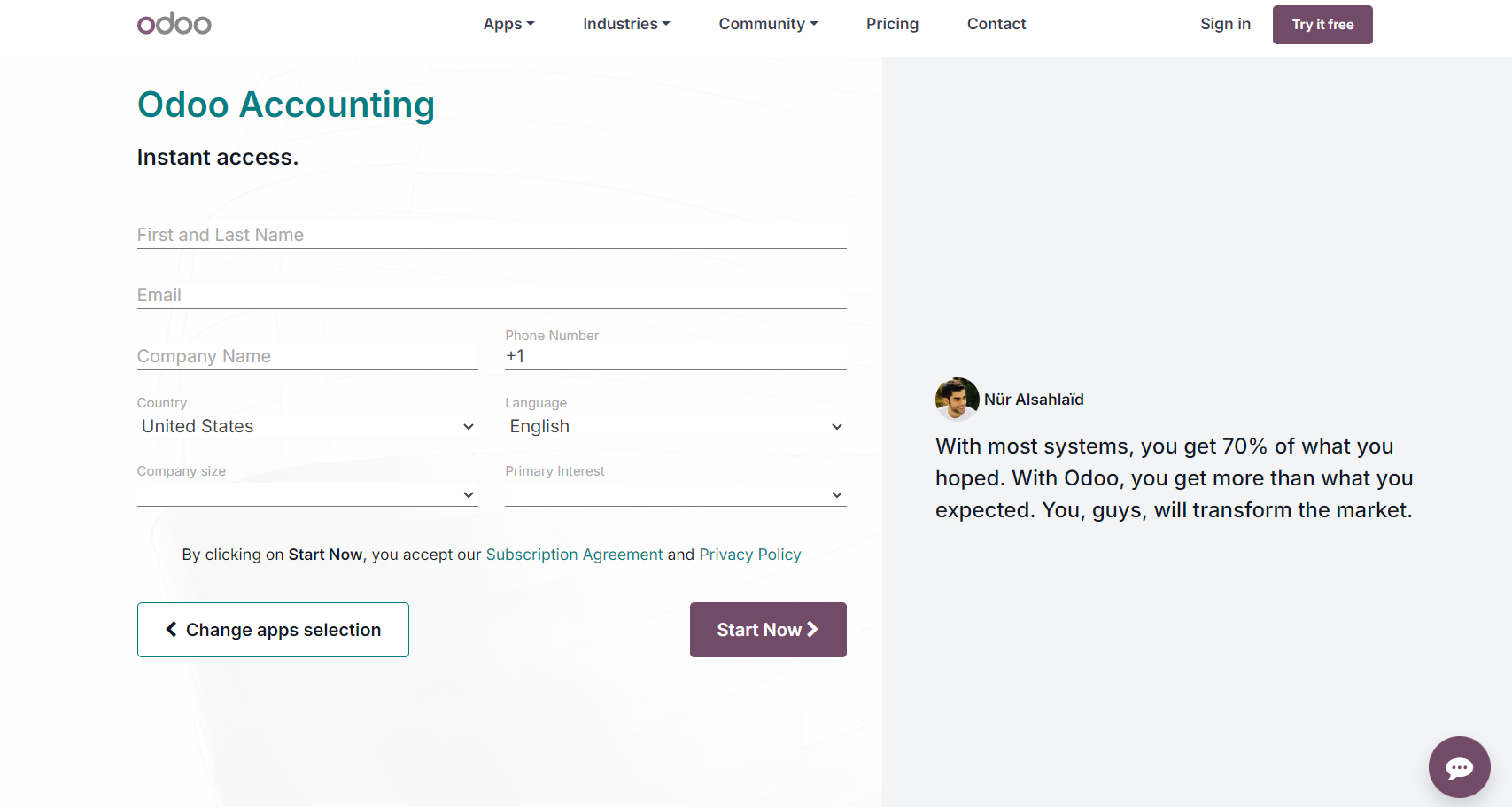
When considering Odoo Accounting Software, several factors influence its pricing. Here’s a closer look at what impacts the cost:
Plan Features and Modules: Odoo offers different pricing tiers based on the number of applications you need. If you require additional modules—like project management, inventory, or CRM—expect the price to rise. Choose the features that align with your business needs to manage costs effectively.
User Count: The number of users accessing Odoo can significantly affect your costs. More users generally mean higher fees, especially if you opt for the Enterprise version. Assess how many team members need access and choose a plan that fits your budget without overspending.
Customization and Integration: If your business needs specific customizations or third-party integrations, that can impact pricing as well. Odoo’s flexibility allows you to tailor the software, but more complex setups can lead to increased costs. Weigh the benefits of customization against your budget.
Hosting Options: Odoo offers various hosting solutions—Odoo Online, on-premises, and Odoo.sh. Each comes with different pricing structures. For instance, Odoo Online provides ease of use with a monthly fee, while on-premises hosting requires more technical expertise but allows unlimited customization. Pick the hosting type that suits your operational needs and financial constraints.
Contract Length: The length of your subscription can also affect pricing. Opting for an annual plan often comes with discounts compared to month-to-month agreements. Consider your long-term needs to make the most cost-effective decision.
What Affects Prices in the Industry Overall?
When diving into the accounting software market, various external factors can influence pricing. Let’s break down what drives costs in this industry:
Regulatory Changes: Changes in financial regulations can impact the features required in accounting software. If new compliance requirements arise, software providers might increase prices to cover the costs of updates and enhancements. Stay informed about regulatory shifts that could necessitate more sophisticated features, influencing your software costs.
Technological Advancements: The rapid pace of technology also affects pricing. As new features and capabilities emerge, software providers may adjust their pricing to reflect the value of these innovations. If a solution offers cutting-edge technology, expect to pay a premium. However, older software without these advancements might be more budget-friendly. Assess how important the latest technology is for your business needs.
Competitive Landscape: The level of competition among accounting software providers affects pricing strategies. A crowded market often leads to price wars, with companies slashing prices to attract customers. However, if only a few providers dominate the market, they may set higher prices. Research the competitive landscape to find the best value for your investment.
Economic Conditions: The overall economy plays a significant role in software pricing. During economic downturns, companies may tighten budgets, leading providers to adjust their prices to remain competitive. Conversely, in a booming economy, demand for advanced features and robust solutions might drive prices up. Keep an eye on economic trends that could affect your purchasing power.
>>> GET STARTED: Cin7 vs NetSuite
How to Get the Best Deal With Odoo Accounting Software?
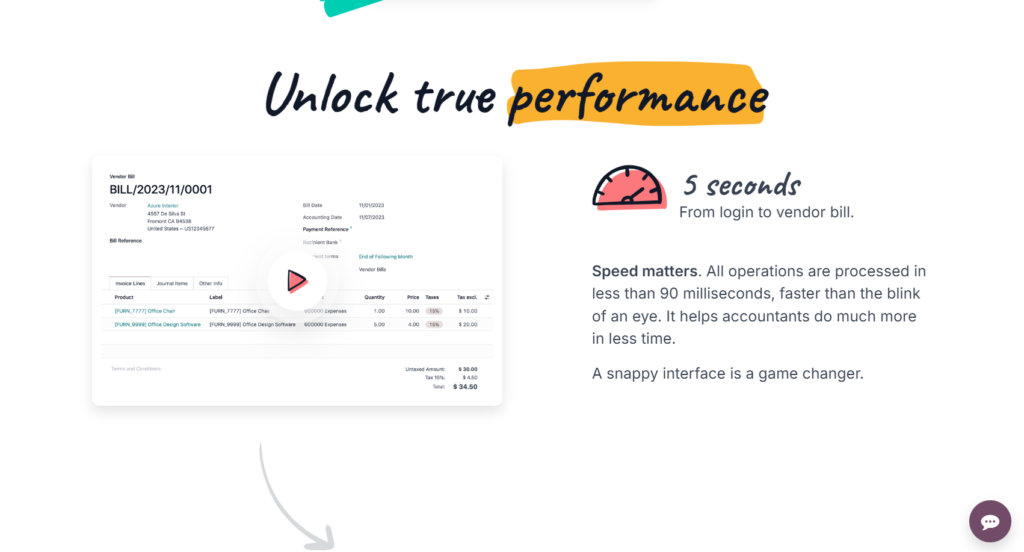
Explore All Available Plans: Start by diving into the various plans Odoo offers. Don’t just pick the first option you see. Each plan has different features and pricing structures tailored to different business needs. Take your time to compare what’s included in each package, so you can find one that perfectly matches your requirements without overpaying for unnecessary features.
Consider Long-Term Commitments: Think about opting for an annual subscription instead of a monthly one. Committing to a longer-term plan often results in significant savings. If you’re confident in Odoo’s capabilities, going for a yearly plan can help you lock in those savings and simplify your budgeting.
Evaluate Customer Support Options: Odoo provides various levels of customer support. Make sure you know what’s included with your chosen plan. If your business will rely heavily on support, consider whether you need premium services. Quality support can save you time and hassle, making it a worthwhile investment.
Look Out for Special Offers: Keep an eye on Odoo’s website for any promotional deals or discounts. Sign up for their newsletter to stay updated on potential offers. Catching a special deal can allow you to access higher-tier features at a more affordable price.
Understand Renewal Rates: Be aware of what the renewal rates will be after your initial subscription ends. Introductory prices can often increase significantly upon renewal. Knowing these details ahead of time helps you plan for long-term costs and avoid surprises.
Can You Afford Odoo Accounting Software Prices?
When considering Odoo Accounting Software, it’s crucial to evaluate a few key factors to ensure it aligns with your budget and needs.
First, what’s your budget? Odoo’s pricing can vary significantly based on the features you choose, so start by assessing how much you’re willing to spend. Whether you’re a small startup or a larger enterprise, understanding your financial limits helps you find a plan that works for you without stretching your resources too thin.
Second, how essential is robust accounting software for your business? If accurate financial management is vital to your operations, investing in Odoo’s comprehensive features could be worth it. The software offers extensive functionalities, including invoicing, expense tracking, and reporting, all of which can streamline your accounting processes and improve efficiency. For businesses that rely heavily on sound financial management, the investment may pay off in the long run.
Third, what about alternatives? If Odoo’s pricing feels a bit high, don’t hesitate to explore other accounting software options. While Odoo has fantastic features, other providers might offer comparable services at a lower cost. Assess your specific needs and consider alternatives that fit your budget without compromising on the essentials.
By keeping these points in mind, you can make a well-informed decision about whether Odoo Accounting Software fits into your financial plan.
Finally: Should You Buy Odoo Accounting Software or Not?
So, is Odoo Accounting Software the right fit for you? If you’re looking for a comprehensive solution that combines robust accounting features with flexibility, Odoo is definitely worth considering. Its modular design allows you to tailor the software to your specific needs, offering everything from invoicing to expense tracking—all in one platform.
However, keep in mind that Odoo’s extensive capabilities come at a price. If you’re on a tighter budget or only need basic accounting functions, you might find more affordable alternatives that still deliver solid performance. It’s essential to weigh what you truly need against what Odoo offers.
In a nutshell, Odoo Accounting Software is an excellent choice if you prioritize versatility and a feature-rich environment. If budget constraints or simpler requirements are your main concerns, exploring more cost-effective options might be the way to go. Ultimately, the best choice hinges on your business needs and financial situation.





